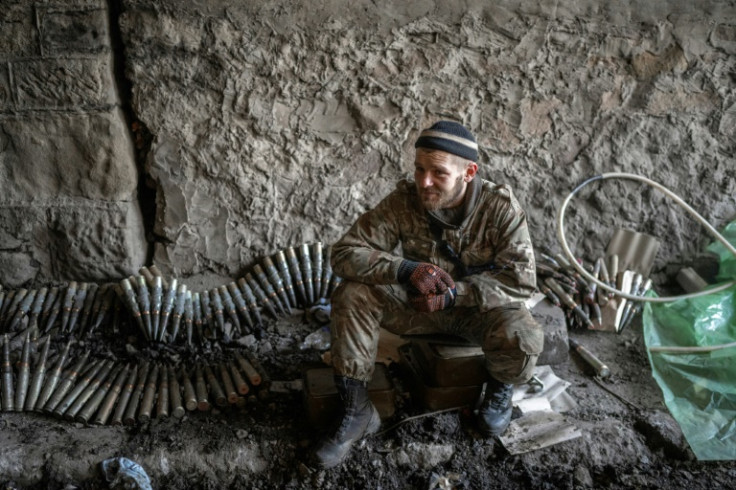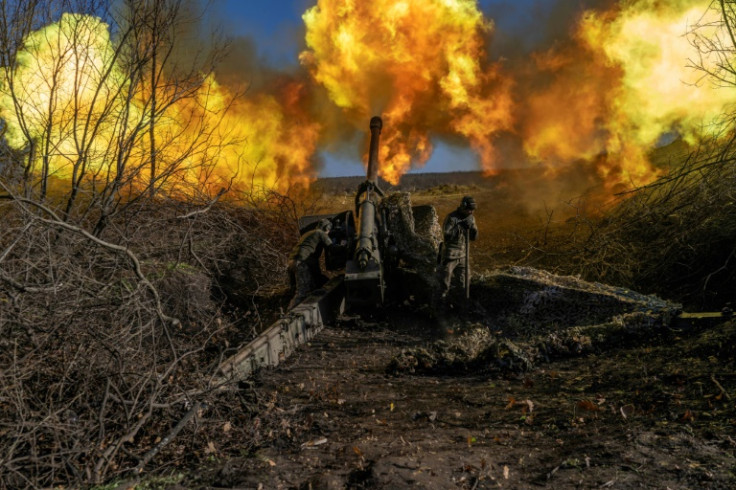Traumatized Ukrainian Soldier Won't 'Let Go' Of Axe While Being Treated At Hospital

KEY POINTS
- The soldier's actions were "a reaction to stress" after being injured in shelling in the war in Ukraine
- One Ukrainian soldier said his unit lacked resources and suffered "many losses"
- Bakhmut is currently the epicenter of the Russia-Ukraine conflict
A Ukrainian soldier shell-shocked from an attack would not let go of an axe despite pleas from first responders to let them treat him, according to a report.
Medics at a field hospital located in a village 9 miles from the Ukrainian city of Bakhmut, the epicenter of the fighting between Ukraine and Russia, opened up about how they treat soldiers who are left in a state of "shock" and severely traumatized as a result of shelling and how they handle the influx of wounded soldiers coming in every day as the now 14-month war continues.
Lyudmyla Symchenko, one of the 15 members of the medical team at this first aid point of the 93rd mechanized brigade, adopted a stern tone while instructing wounded servicemen during treatment as the traumatized soldiers have a hard time listening and following instructions, Kyiv Post reported.
"Many soldiers are traumatized from the shelling and so they do not understand immediately," the 55-year-old anesthetist told AFP.
"Yesterday, for example, we had trouble taking an axe out of a man's hand. He was in shock and would not let go of the axe. It is a reaction to stress," she said.
One of the soldiers brought to the facility, where Symchenko and the other doctors, nurses and assistants work round the clock treating wounded Ukrainian servicemen before they are transferred to a hospital in the nearest city, told the news agency that his unit has lost more than 40 members since the start of the war in February 2022.
A member of a paratrooper unit not linked to the 93rd brigade, 25-year-old Denis said his unit lacked resources and had suffered "many losses."
"There were 124 fighters at the start of the war. Now, there are fewer than 80," said Denis, who was wounded in his shoulder after being struck by mortar fire while digging a trench south of Bakhmut.
Denis' story is just one of the many narratives from the front lines of the conflict as the negative effects of the war continue to take a heavy toll on the Ukrainian forces' psyche.
Medical workers also feel exhausted and demoralized as casualties in Bakhmut pile up.
"It's been tough for the past month," Volodymyr Pikhulevskiy, a 38-year-old surgeon at the facility, told AFP. "On some days there are 100 wounded, other days 50 or 60. Everything depends on what is going on in Bakhmut."
After Russian forces made headways in Bakhmut in December 2022, the aid point, which was initially based in the city, had to be moved to another place. They tried to return in January, but they moved away again after suffering intense shelling. Four doctors from the unit have been killed since the invasion began.
Wounded soldiers are only brought to the aid point at night as Russian forces regularly shell the roads during the day. Those who are wounded in the morning or during the day have to wait, and some of them don't make it anymore.
"It's very difficult for our guys there [in the front lines]. I can't imagine how it is there. It is terrifying," Pikhulevskiy said, as a fresh batch of wounded soldiers arrived at around 10:30 p.m. on the day of the interview, mere moments after the medics dispatched the ones who had been treated to hospitals.
The soldier who was driving the armored car was himself wounded, with the ends of his fingers having been blown off. Another soldier in the car who was in his 20s had a shrapnel wound behind his head, close to his backbone, while another two sustained wounds in their backs.
Symchenko said that with the number of soldiers brought to their aid point, she and others in the medical team rarely leave the facility.
"Our only distraction is the phone. We don't go out. We're here all the time. We sleep here, we eat here, we work here," Symchenko said. "In a month, I've only been out once to the dentist and the hairdresser to cut my hair shorter so it would dry quicker."

© Copyright IBTimes 2024. All rights reserved.






















